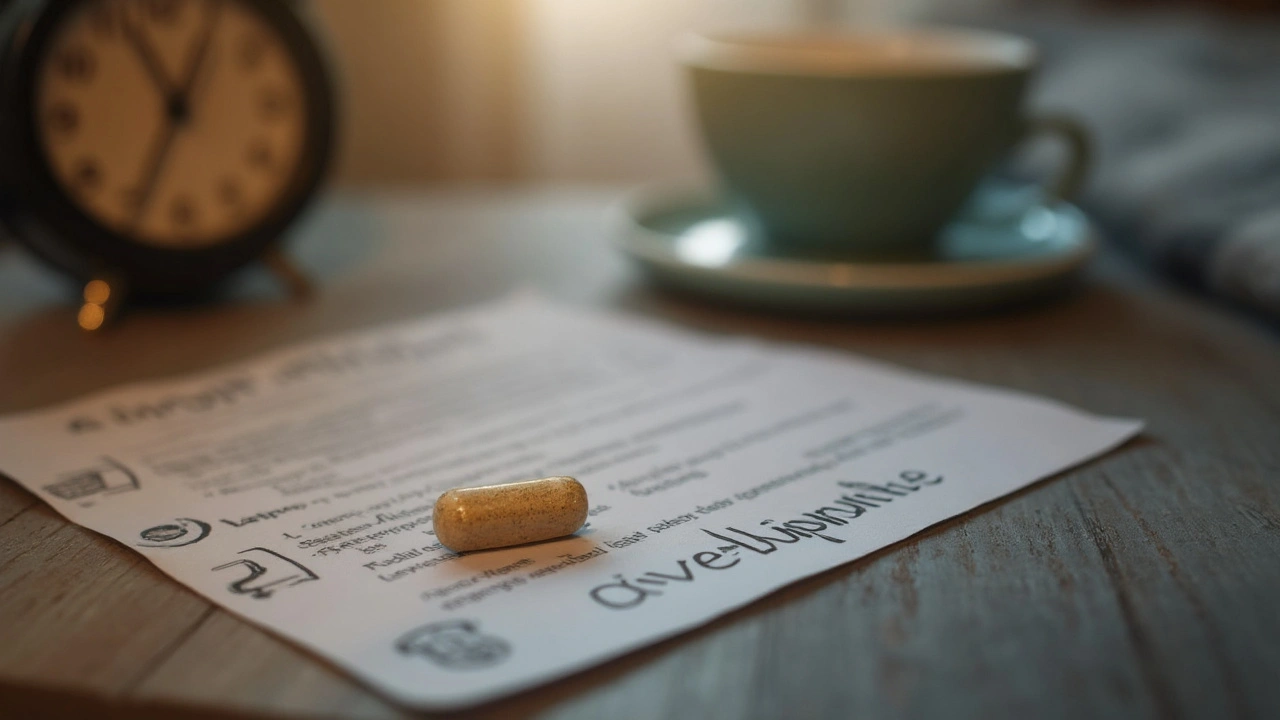Endep (Amitriptyline): Uses, Side Effects, and Effective Tips for Safe Use
 Jun, 28 2025
Jun, 28 2025
Think you know all there is to antidepressants? There’s one, Endep, that’s been around since the 1960s and still sparks debate among doctors. Some see it as a versatile lifesaver; others, a relic with tricky side effects. Yet every month, thousands of people fill prescriptions for Endep—more often than you’d guess, not for depression, but for pain or sleep. What’s really going on with this old drug, and should you care if it lands on your prescription list?
What Exactly Is Endep and Why Do Doctors Prescribe It?
Endep, generically known as amitriptyline, wasn’t just another pill invented and forgotten. It was unleashed in 1961 as one of the first tricyclic antidepressants. The name’s a mouthful: tricyclic just describes the three-ring structure in the chemical, nothing more. In the wild west of psychiatric medicine back then, Endep was an early answer to miserable depression, and it still works—sometimes better than newer pills. The big question, though, is what really happens when someone swallows that little tablet.
It works by raising serotonin and norepinephrine levels in the brain. If you’ve heard of SSRIs like Prozac, those target mainly serotonin, while Endep gets two birds with one stone, which is why it can pack a double punch. Odd fact: while plenty of people use Endep for traditional depression, these days you’re just as likely to hear about it being prescribed for chronic pain, nerve damage, migraines, fibromyalgia, or even severe insomnia. In fact, more than 50% of amitriptyline prescriptions are now for something other than straightforward depression. The drug calms down overactive nerves through mechanisms that are still being unraveled. Some call it the Swiss Army knife of psychiatry – not always subtle, sometimes with a sharp edge, but awfully useful if you’ve run out of options.
Endep usually comes in tablet strengths between 10mg and 150mg. Most doctors start low, with something like 10 to 25mg nightly, especially for nerve pain or sleep. In depression or anxiety, a higher dose is typical. Here’s the surprise: at really low doses, Endep’s side effect profile is much more tolerable, and the sedating effect that used to knock folks out in the ‘70s can actually help with pain and insomnia now. You might know someone with migraines or irritable bowel syndrome who found stubborn relief after trying everything else—Endep often becomes the unsung hero in those cases. Still, it’s not for everyone, and getting the dose right is a bit of an art.
Prescribing Endep these days often means weighing the risk of side effects with the possible payoff. Some modern psychiatrists call it “antiquated.” But others swear by its ability to tackle tough-to-treat symptoms. In the UK, Endep is on the World Health Organization’s List of Essential Medicines—proof that, for many, it remains a trusted old workhorse.
Here’s a quirky fact: A 2019 clinical review in the British Journal of Psychiatry traced how Endep’s pain-relieving talents made it the first-line therapy for neuropathic pain in the NHS despite all the newer options. It’s a rare instance of an antidepressant outlasting its original competitors and still earning new jobs more than half a century after launch.

Popular Uses, Surprising Benefits, and Tips for Taking Endep
Endep wears a lot of hats these days, and not just in psychiatry clinics. It’s a go-to for chronic tension headaches, diabetic neuropathy, and even irritable bowel syndrome. It’s also a secret weapon for people who have trouble sleeping and fail to respond to sleeping pills. A study published by Cleveland Clinic in 2023 found patients with chronic migraines that didn’t budge with regular painkillers finally got real relief from low-dose Endep. And not just a minor upgrade—people went from multiple weekly migraines to just one or two a month.
What about anxiety? At the right dose, Endep can settle generalized anxiety and panic better than many of the modern options, especially if sleep is a problem. And while it’s not the first pill for PTSD or obsessive-compulsive disorder, it sometimes gets used when front-line treatments aren’t cutting it.
If you snore loudly or have sleep apnea, though, Endep is usually sidestepped, because it can relax airway muscles too much. It’s not for everyone, and there are distinct quirks about how people react to it. For example, Endep can be a problem for older adults because it’s anticholinergic—it means it clogs up nerves responsible for memory, peeing, and even sweating. That’s why you don’t see it handed out to folks in nursing homes often.
Want to boost your chance of success with Endep? Here are some real-world tips you’d hear from pharmacists:
- Take Endep at night. Besides taming pain and anxiety, it makes most people sleepy, sometimes almost too much.
- Start low and ramp up slow. If you get dry mouth, blurred vision, or weird dreams, let your doctor know right away. Adjustments are common and nothing to be embarrassed about.
- Don’t suddenly stop taking it. Your nervous system gets used to the drug, and quitting all at once can send things haywire—headaches, shakiness, stomach upset, and irritability can all crop up.
- Avoid alcohol (or at least cut back). Mixing booze with Endep does a number on your coordination and makes sedation worse.
- If you’re taking meds for bipolar disorder, heart problems, or have a history of seizures, tell your doc up front. Endep can mess with those issues or interact with several other drugs in some funky ways.
Bizarre but important: grapefruit juice interacts with Endep, boosting levels in your body and bringing a higher risk of side effects. If you’re a juice fan, steer clear while on this med. Also, be ready for side effects to change over time—sometimes, people start off drowsy but then find the sedating effect fades and dry mouth or weight gain creeps in months later.
You should also know Endep’s effect on pain often kicks in before the mood-lifting part. For nerve pain, people may notice improvement within a week, but it may take a few weeks for depression relief to show up. Always keep your doctor in the loop, especially if you suspect any mood changes or odd physical symptoms. They really can help tweak the dose or switch you to a different treatment if needed.

Risks, Side Effects, and What to Watch Out For When Using Endep
Every medicine has a flip side, and Endep is no exception. It’s infamous—especially at higher doses—for side effects you might already guess: dry mouth, constipation, sleepiness, dizziness, and weight gain. But there are some you might not expect. For instance, some users develop really vivid dreams or odd tingling in their hands and feet. A small number even report trouble with memory or confusion, especially if they’re older or take a lot of meds.
One of the most annoying things with Endep is dry mouth. You might find yourself chugging water or chewing gum all the time. There’s a silver lining, though: dry mouth can fade in a few weeks for many folks, though for some—especially on higher doses—it sticks around. Another one that catches people off guard is urinary retention. Basically, you find it tricky to pee, and this can be worrisome (personally, I’d call the doc on this one sooner rather than later).
Heart rhythm problems are rare but worth knowing about, especially if you’ve got a family history or take other meds that affect your heart. Before starting, some docs order an EKG, particularly for older adults or anyone with chest pain history. Orthostatic hypotension is one of those fancy-sounding terms—what it really means is you might get dizzy going from sitting to standing, especially at the start. That’s why doctors always harp on rising slowly after you’ve been sitting or lying down.
If you develop blurred vision, severe constipation, or confusion, that’s your cue to call for advice. And, like with any antidepressant, you’ll want to keep a close eye on young adults or anyone with a history of suicidal thoughts during the first few weeks of treatment. A 2022 study published in The Lancet Psychiatry confirmed that while new cases of suicidal thinking are rare, they’re still possible on all antidepressants, and Endep is no exception.
Here’s something most people never hear: Endep can interact with seemingly harmless over-the-counter stuff, like cold medicine or allergy pills. Combining it with diphenhydramine (Benadryl) can seriously ramp up the sleepy side effect—few people realize this until they’re knocked out for half a day. Other drugs, like tramadol for pain or SSRIs for depression, can increase the risk of serotonin syndrome, a dangerous but rare condition featuring confusion, fever, and muscle twitching. That’s why every pharmacy always says “bring your full med list to the counter.”
Some rare but serious symptoms include chest pain, fast or pounding heartbeat, yellowing skin, or eye pain. If those crop up, don’t wait—get checked right away.
Pregnancy and breastfeeding are special cases. Endep is generally not the first choice for pregnant women due to possible risks to the baby’s heart and withdrawal symptoms in newborns. Breastfeeding? Small amounts of amitriptyline pass into breast milk, so pediatricians usually weigh the risks and benefits before signing off. Always double-check with your doctor or OB-GYN.
For most, though, Endep proves a steady ally—especially at doses lower than what’s usually prescribed for depression. If you’re starting on Endep, having the facts lined up, chatting with your doctor, and being honest about even the little side effects makes all the difference. Sometimes, the simplest pill hides the most interesting stories—and the practical things you wish someone had told you sooner.

Alice Witland
July 18, 2025 AT 16:32Ah, the good old Endep (amitriptyline), a medication that’s been around the block for a while! It’s always fascinating to see these older antidepressants still in use, especially since they come with quite the side effect menu. I mean, sure, they work for depression and pain, but the drowsiness and dry mouth are something else. It’s almost like a random lottery of fun, isn’t it?
That said, it’s important people really understand what they’re getting into with Endep. The article provides some solid safety tips, but I hope anyone considering this medication also gets the full picture from their doctor. And let’s not forget the importance of balancing benefits with those pesky side effects.
Honestly, no medication is perfect, but having the right info can save a lot of headaches. Anyone here tried Endep and want to share how it affected your sleep or mood?
Breanna Mitchell
July 18, 2025 AT 17:32I’ve actually been on Endep for a few months now for neuropathic pain combined with depression, and it’s been quite a journey. At first, the drowsiness was brutal—I pretty much turned into a nap machine. But honestly, it got better with time. The key is definitely to give your body some time to adjust.
One tip I’d add is to avoid alcohol completely because it really amplified the sedation for me, which was not fun at all. Also, don't be afraid to communicate with your doctor about the dosage. I pushed for a lower dose, and that seemed to strike a better balance.
Feeling hopeful is important. It might feel tough at the start, but persistence and patience can make a real difference when using Endep.
Michelle Wigdorovitz
July 18, 2025 AT 18:32This topic caught my eye since I’ve been curious about how amitriptyline works differently for pain versus depression. It’s fascinating how one drug can have multiple mechanisms of action, right? The way it not only adjusts neurotransmitters but also affects pain pathways is pretty complex.
Also, I read somewhere that it can improve sleep architecture, which explains why some people get better rest while on it. Has anyone noticed changes in their sleep patterns, either good or bad?
It’s definitely a balancing act between managing symptoms and avoiding those unwelcome side effects. I wonder if ongoing research will lead to more refined versions with fewer drawbacks.
Arianne Gatchalian
July 18, 2025 AT 19:32To echo what others are saying, communication with healthcare providers is crucial when using Endep. Everyone’s experience can be vastly different, and what works for one might not for another.
It’s reassuring to see resources that include genuine safety tips because these medications do come with risks that people should be fully aware of. For example, the tendency toward increased appetite and potential weight gain can be a real concern over time.
But I also want to appreciate the fact that it can be effective for those struggling with chronic issues where other options haven’t worked well. The more informed we are, the better we can navigate treatment plans.
Aly Neumeister
July 18, 2025 AT 20:32Is anyone else bothered by how dry the resources often are when talking about these meds? Like, sure, it’s “safe” if you follow the instructions, but what about the day-to-day struggles? My partner has been on amitriptyline, and even though the article touches on side effects, it doesn’t quite capture how annoying the grogginess is.
Oh, and the confusion part can get scary sometimes, makes me wonder if it’s worth it. Then again, the pain relief she’s gotten is undeniable, so there’s that.
More personal stories would be nice. Anyone got wild or unexpected side effect tales from Endep?
Sarah Seddon
July 18, 2025 AT 21:32I totally get that! When my close friend started Endep, she told me it felt like she was in a fog for the first couple of weeks. But with support and proper pacing, the fog lifted, and she began to reclaim her days with less pain and better sleep.
It’s a rocky road, no doubt, but sometimes these meds provide that crucial window of relief that people desperately need to start healing. Encouragement and patience are key, both from users and those around them.
Has anyone found good strategies to cope during the toughest adjustment phases? I’d love to hear some tips.
Chris Wiseman
July 18, 2025 AT 22:32Oh, the sweet irony of relying on a chemical concoction to cure the maladies it might also bring about: Endep, a salve and a curse wrapped in one tiny pill. Truly, we are at the mercy of molecular whimsy mingling with neural idiosyncrasies.
The duality of this drug’s role as an antidepressant and analgesic is as poetically paradoxical as the human condition itself, isn’t it? You find solace in sedation, but at what price? Is it merely masking the existential dread with pharmacologic delight?
Still, I won’t dismiss its utility—sometimes the landscape of the mind needs careful recalibration, a nudge from the prosaic pharmacology that only amitriptyline can provide. Yet, I wonder if such reliance dulls our organic resilience in the long run.
Martin Gilmore
July 18, 2025 AT 23:32Okay, let’s be blunt—people often underestimate the real discipline required when taking medicines like Endep. It’s not some magic fix, and if you’re looking for sunshine and rainbows without effort, you’re in for a rude awakening.
The warnings about side effects? Seriously important. I've seen too many ignore them and end up in way worse shape. Follow the rules, watch your diet, and get plenty of rest. No excuses.
And for anyone complaining about grammar here, just get over it. The facts are what matter. If you’re taking something that messes with your brain chemistry, discipline isn’t optional; it’s mandatory.
Quinn S.
July 19, 2025 AT 00:32I must interject with the utmost insistence that any discussion regarding amitriptyline usage be framed within a strict adherence to clinical guidelines. This medication’s complicated pharmacodynamics necessitate precise administration and vigilant monitoring, not casual experimentation.
Furthermore, all discourse should emphasize the importance of certified medical consultation prior to initiation. The consequences of misuse or neglect of proper regimen can be dire, ranging from cardiac irregularities to severe cognitive impairment.
On a related note, the discussion of side effects must always include the admonition against polypharmacy without oversight; risks significantly multiply otherwise.
Dilip Parmanand
July 19, 2025 AT 01:32Great discussions here! Just want to remind everyone that if you’re starting Endep, patience is essential. It’s not an instant fix, and often the benefits come after a few weeks. Keeping in touch with your healthcare provider to report any side effects helps tailor the treatment to you personally.
Also, lifestyle adjustments like regular sleep patterns and avoiding alcohol can make a big difference in tolerability and effectiveness.
Does anyone have experience combining Endep with non-pharmaceutical therapies? I’m curious how that worked for you.
Ari Kusumo Wibowo
July 19, 2025 AT 02:32Adding to what’s been said, I feel like we need to emphasize mental health openness. Taking Endep isn’t a sign of weakness; it’s a step towards managing your wellbeing. The stigma surrounding psychiatric meds can be crippling.
Sure, side effects exist, but with support and proper guidance, many people find significant relief. Don’t hesitate to ask questions and voice concerns. Mental health is as real and important as physical health.
Anyone here want to share how they overcame the stigma or found support during their treatment?